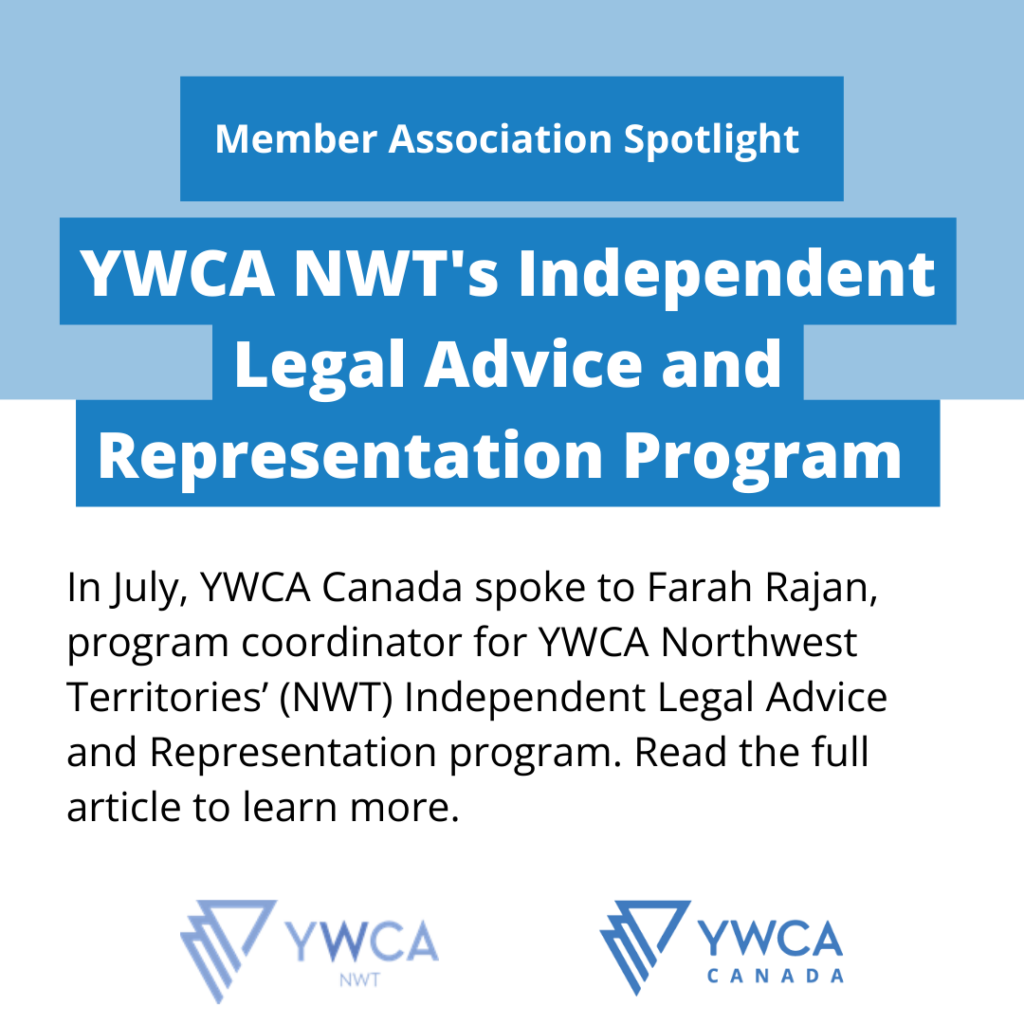Read: 4 minutes
In July, YWCA Canada spoke to Farah Rajan, program coordinator for YWCA Northwest Territories’ (NWT) Independent Legal Advice and Representation program, also known as ILAR program. YWCA NWT was established in 1966, and the ILAR program was established in February 2023. In this interview, Farah shares the program’s objectives, recent successes, and the importance of the program in the implementation of MMIWG calls to justice.
Q: Can you tell us a bit about YWCA NWT?
A: YWCA NWT’s mission is to create a safe Northern society where women and families can reach their full potential. Since 1966, we’ve had transitional housing initiatives, focusing on stability and affordable housing for families, family violence shelters, afterschool care for children and youth, and empowerment programs!
Q: What is the ILAR program?
A: Everywhere in Canada we see the effects of residential schools, and here in Northern Canada, we see how they have impacted our Indigenous populations. It can be seen in communities by the high rates of substance abuse, mental health concerns, and family violence. Research conducted in 2019 by both YWCA NWT and the government of the Northwest Territories found that survivors of family violence and sexual assault have difficulty navigating the legal system. This program is a response to the need for specialized legal support from the Missing and Murdered Indigenous Women and Girls calls for justice Final Report (MMIWG).
The ILAR program responds to the need for free specialized legal support. We found that most incidents of intimate partner and family violence are not reported to the RCMP (Royal Canadian Mounted Police), so we have not made reporting to law enforcement a requirement for this program. ILAR provides up to 4 hours of free, confidential legal advice, and up to 30 hours of free, independent legal representation for incidents of sexual assault. The program is for anyone who is experiencing family, gender-based, and/or sexualized violence. ILAR helps survivors explore their legal options and aid them with safety planning to enable them make informed decisions for their situation.
Furthermore, we have five lawyers on our panel right now. They all have experience in offering legal support, have lived in Northern Canada, are familiar with culturally specific programming, and approach this work with a trauma-informed lens. Program participants also have the option to choose a lawyer or be matched with one based on availability.
Survivors can join the program by calling, emailing or texting a phone number, or being referred by a community agency. Most often, our referrals come from the Public Prosecution Service of Canada (PPSC), family violence shelters, and more. Then, the coordinator, me, will complete an intake form with the participant. After receiving the legal advice, the ILAR coordinator always follows up with the survivor to see if they need any further support.
Q: Do you work with other organizations or institutions?
A: Yes, we work closely with the Government of the Northwest Territories Department of Justice. The federal government of Canada has provided multi-year funding for this program. We also work closely with other community agencies to ensure survivors are getting the support that they need.
Q: Have you experienced any obstacles with this program?
A: Yes, definitely. I think the biggest obstacle is not having enough lawyers. There have been many referrals, but if there are not enough lawyers available, we can’t offer survivors the flexibility to choose their own lawyer. Many survivors prefer having a female lawyer, so we are working hard to get more female lawyers on the panel. Furthermore, we are trying to find lawyers who specialize in different areas of law.
Also, in the north, we have a lot of remote communities. Sometimes in these communities, survivors don’t have access to cellphones. It can be really hard to reach them, so communicating with some survivors has been a challenge. If we can speak with a support person, such as an agency professional, family member, or someone who has access to a phone that the survivor is comfortable with, we can have indirect communication with the survivor and still offer support.
Q: How does the program measure its success and impact? Are there any performance indicators or metrics used?
A: Currently, it’s mostly immediate feedback. We are asking survivors, if they are comfortable, to complete a follow-up survey after they are done with our services because court proceedings can take many months. Most cases are still ongoing because court proceedings can take many months, so we have only received a few feedback surveys.
Q: How do you feel about the program?
A: I am definitely proud of it. It is obvious how much of a need there is in the north, so we’re committed to doing the program justice and making sure survivors have the support that they need going through the legal system. I am excited to see where it goes as time moves on.
Q: Can you share any success stories or notable achievements?
A: One achievement is that there is no waitlist. Almost all survivors are connected with a lawyer in just a few days!
Also, there is a survivor who received independent legal advice by speaking with one of our lawyers. Because her court date was far, she was nervous about coming in contact with her ex-partner. She was provided with extra support around safety planning and local resources to support her while waiting for her court date.
Q: Are there any plans to expand or modify the program in the future?
A: We plan to expand the accessibility of the programs by reaching out to more remote communities, making sure they are aware of programs, and increase the number of lawyers – specifically female lawyers. I am excited to see how the program moves forward, how we can make it more accessible, and how to ensure that survivors get the most out of it.
To learn more, visit YWCA NWT website
To learn more about this program, visit the page dedicated to this program
